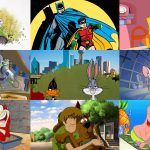10 Times Cartoons Predicted the Future: Cartoons have a knack for predicting future trends and developments, from technological advancements to societal shifts. While often dismissed as mere entertainment, these animated shows have often offered glimpses into the future. This article explores ten instances where cartoons proved surprisingly prescient in their predictions.
Smartwatches

Inspector Gadget (1983)
Before the advent of smartwatches, the iconic cartoon Inspector Gadget featured a character named Penny who sported a high-tech watch capable of communication, surveillance, and various other functions. This futuristic gadget foreshadowed the rise of wearable technology decades later.
Video Calling

The Jetsons (1962)
The Jetsons, set in a futuristic world, showcased video calling technology as the “televiewer,” allowing characters to communicate face-to-face over long distances. Today, video calling has become commonplace in smartphones and computers, mirroring the cartoon’s future vision.
Virtual Reality

YTVReBoot (1994)
ReBoot, an animated series set inside a computer, featured virtual reality environments and digital avatars long before VR technology became mainstream. The show’s depiction of immersive digital worlds foreshadowed the rise of virtual reality gaming and experiences in the real world.
Touchscreen Technology

Star Trek: The Next Generation (1987)
While not strictly a cartoon, Star Trek: The Next Generation included futuristic devices like the “PADD” (Personal Access Display Device), which resembled modern touchscreen tablets. This portrayal of handheld touch-sensitive devices predated the decades of adoption of touchscreen technology.
Autonomous Vehicles

Futurama (1999)
In an episode of Futurama, the animated series envisioned a world where autonomous vehicles called “robotic cars” roamed the streets, transporting passengers without human drivers. This portrayal anticipated the development of self-driving car technology, which is now being tested and deployed in real-world settings.
Artificial Intelligence

The Simpsons (1989)
The Simpsons has made several predictions that have come true over the years, including advancements in artificial intelligence. In one episode, the show depicted a future where household robots like “Ultrahouse” were equipped with sophisticated AI capabilities and offered assistance with daily tasks.
3D Printing

Dexter’s Laboratory (1996)
Dexter’s Laboratory featured an episode where the titular character, Dexter, invented a device capable of instantly creating physical objects from digital designs. This concept is similar to modern 3D printing technology, which allows users to fabricate objects layer by layer from digital models.
Augmented Reality

Arthur (1996)
In an episode of the children’s show Arthur, the characters use a pair of futuristic glasses that overlay digital information onto the real world, providing helpful visual cues and information. This augmented reality depiction mirrors current developments in AR technology, which enhances real-world environments with digital content.
Online Shopping

The Simpsons (1989)
Once again, The Simpsons predicted the future by portraying online shopping in an episode where the character Marge orders a dress through a primitive version of the internet. This depiction foreshadowed the rise of e-commerce platforms like Amazon and eBay, revolutionizing our shopping.
Climate Change Awareness

TBS & SyndicationCaptain Planet and the Planeteers (1990)
Captain Planet and the Planeteers addressed environmental issues and climate change long before they became mainstream concerns. The show’s focus on environmental conservation and activism foreshadowed the growing awareness of climate change and the need for global action to address it.
In Conclusion, Cartoons can anticipate future developments and trends, often providing insights into what lies ahead. These animated shows offer valuable glimpses into the future, inspiring imagination, innovation, and reflection on the world, whether technological innovations, societal changes, or environmental issues.
FAQs about 10 Times Cartoons Predicted the Future
Q: Are cartoons capable of predicting the future?
A: While cartoons may not be able to predict specific future events, they often reflect and comment on contemporary issues and trends in society, sometimes offering eerily accurate insights into what may come.
Q: How do cartoons manage to predict the future?
A: Cartoons often draw inspiration from real-world events, scientific advancements, and cultural trends, allowing them to speculate on possible future scenarios with varying degrees of accuracy.
Q: Why are some cartoons more predictive than others?
A: Cartoons that incorporate elements of speculative fiction, social commentary, and technological innovation are more likely to offer insights into the future as they engage with themes and ideas that resonate with audiences on a deeper level.
Q: Can cartoons influence the future?
A: While cartoons may not directly influence the future, they can shape public discourse, raise awareness about important issues, and inspire viewers to think critically about the world around them, potentially leading to positive change.
Q: Should we take predictions from cartoons seriously?
A: While cartoons should not be viewed as authoritative sources of future predictions, they can offer valuable perspectives and provoke meaningful discussions about the possibilities and challenges ahead.
This post was created with our nice and easy submission form. Create your post!




